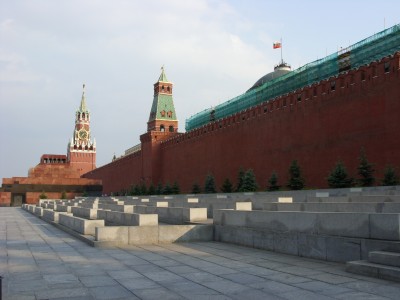Russia's Covert Influence in Europe: Current Strategy Only "Plan B"
The Czech government recently revealed the existence of a Moscow-funded propaganda network that used the Prague-based online portal Voice of Europe to influence the upcoming EU elections. Austrian political scientist Gerhard Mangott and his Ukrainian colleague Anton Shekhovtsov explained that this tactic was merely Russia's "plan B".
 The Kremlin at the center of covert propaganda operations and political influence in Europe. / Picture: © Wikimedia Commons / Naotokurihara / CC BY-SA 4.0
The Kremlin at the center of covert propaganda operations and political influence in Europe. / Picture: © Wikimedia Commons / Naotokurihara / CC BY-SA 4.0
Europe's political landscape was recently shaken by the exposure of a Moscow-funded propaganda network that deliberately sought to influence public opinion and political decisions in the run-up to the EU elections. The Czech government played a key role in exposing this operation, which used the Prague-based online portal Voice of Europe as a platform for spreading Russian propaganda.
The primary targets of this campaign were right-wing and national conservative parties in Europe, as experts explained in a recent online discussion with media representatives. Political scientists Gerhard Mangott and Anton Schechowzow explained, as reported by ORF, that this strategy was merely Russia's "Plan B". Originally, Moscow had intended to directly influence decision-makers in the political center and corruption-prone politicians. After this tactic failed, the focus shifted to right-wing parties.
The financial resources that Russia uses for such propaganda activities are considerable. Gerhard Mangott estimates that between 150 and 200 million dollars are spent annually on such campaigns worldwide, which underlines the seriousness and scale of these efforts. Anton Shekhovtsov noted that while the budget for the now-banned Voice of Europe portal was "only" in the hundreds of thousands, this still represents a significant investment in influencing public opinion.
Russia's influence
The revelations shed a harsh light on Russia's complex and far-reaching efforts to manipulate political processes in the European Union. Money reportedly flowed from the network to politicians in Germany, Belgium, France, Poland, Hungary, and the Netherlands, highlighting the geographical breadth and potential depth of influence. Interestingly, Austria does not appear to be involved in the scandal.
According to media reports, the Ukrainian oligarch Viktor Medvedchuk, who is close to the Kremlin, and the media entrepreneur Artem Marchevskyi are behind this network, who sought to protect their interests in Ukraine through contacts with members of the EU Parliament, including members of the right-wing populist Alternative for Germany (AfD) and the French far right. The connections between these networks and their tactics paint a disturbing picture of international politics, where state-sponsored propaganda and financial incentives are used to influence political discourse and elections.
In Germany, the case caused particular concern after the AfD called on its member of the Bundestag and European election candidate Petr Bystron to withdraw from the campaign. This came after reports emerged suggesting that Bystron may have received financial support from the platform. Chancellor Olaf Scholz expressed concern about the reports and warned that they should be taken seriously.
The exposure of this propaganda network and the resulting political entanglements provide an alarming example of the subtle and often covert methods by which states attempt to influence the policies of other countries. While the immediate impact of this specific campaign is still under investigation, the underlying message remains clear: Europe's democracies face an increasing threat of foreign influence undermining their political processes and the integrity of their elections.



